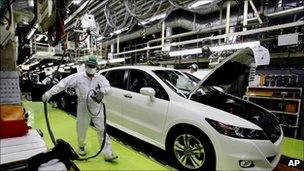Japan says exports fell 12.5% in April due to quake
- Published

Japanese automakers have been working at reduced capacity after the earthquake and tsunami
Japan's exports dropped by 12.5% in April, from a year earlier, after the earthquake and tsunami in March disrupted factory production.
The big fall in exports pulled the country's trade balance into a deficit of 463.7bn yen ($5.6bn ; £3.5bn) last month.
The deficit was smaller than economists had expected.
Japan's imports surged by 8.9% in April from a year earlier, reflecting higher prices for commodities.
The country has been forced to import large amounts of fuel, after the 11 March earthquake and tsunami crippled electricity generating plants.
The natural disasters left more than 24,000 people dead or missing.
The destruction to factories forced several manufacturers, notably Japan's car makers, to suspend production.
Junko Nishioka, an economist with RBS Securities Japan, said the trade deficit was likely to continue.
"Japan's economy has already suffered from rising import prices and now production is slumping due to the power shortage, which is a double-whammy for corporate activity," he said.
Japan's economy, the world's third largest, slid back into recession in the first three months of 2011, after the devastation caused by the earthquake and tsunami.
Gross domestic product shrank 0.9% in the period between January and March.
Japan's economy has now contracted for two consecutive quarters, the generally accepted definition of a recession.
- Published27 April 2011
- Published20 April 2011
- Published13 April 2011